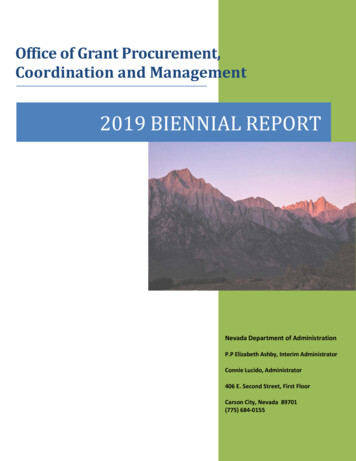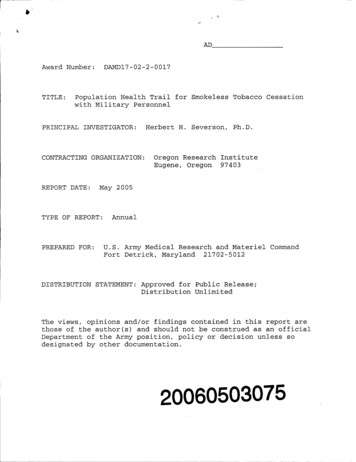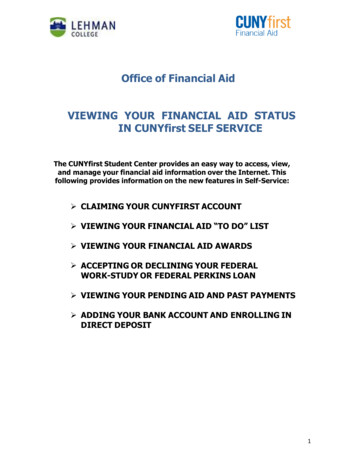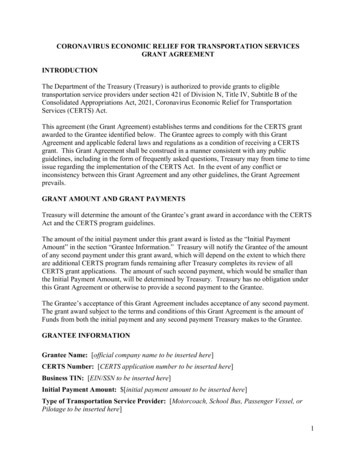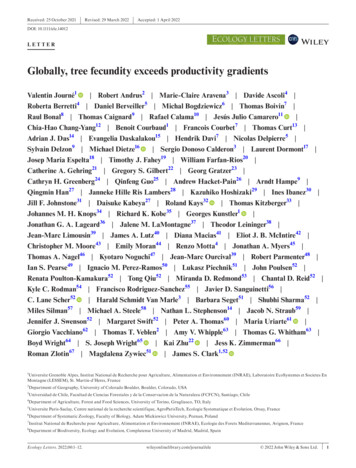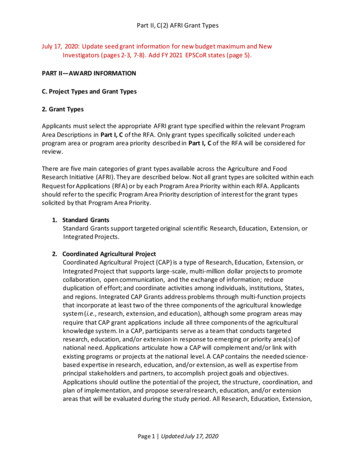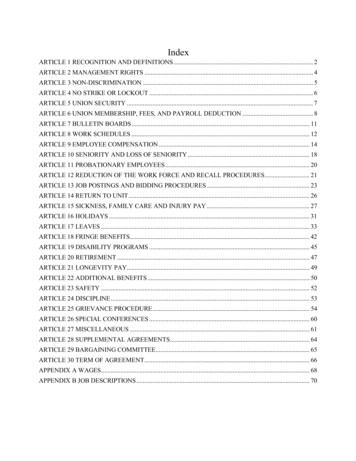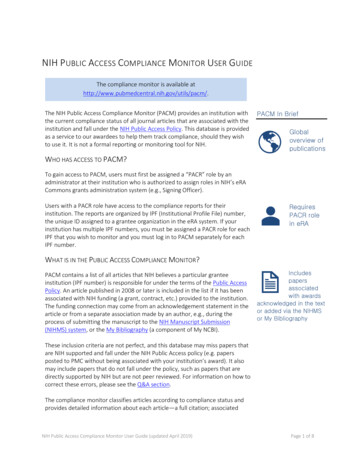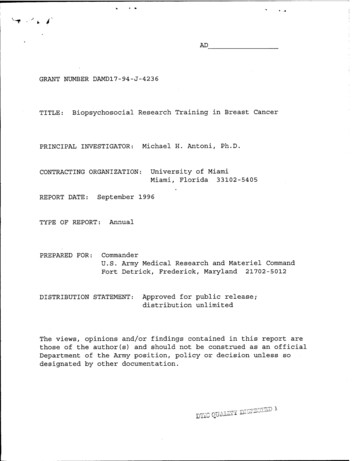
Transcription
1,. -f -' „/ADGRANT NUMBER DAMD17-94-J-4236TITLE:Biopsychosocial Research Training in Breast CancerPRINCIPAL INVESTIGATOR:CONTRACTING ORGANIZATION:REPORT DATE:University of MiamiMiami, Florida 33102-5405September 1996TYPE OF REPORT:PREPARED FOR:Michael H. Antoni, Ph.D.AnnualCommanderU.S. Army Medical Research and Materiel CommandFort Detrick, Frederick, Maryland 21702-5012DISTRIBUTION STATEMENT:Approved for public release;distribution unlimitedThe views, opinions and/or findings contained in this report arethose of the author(s) and should not be construed as an officialDepartment of the Army position, policy or decision unless sodesignated by other documentation. TIC (&*"" * x
Form ApprovedOMB No. 0704-0188REPORT DOCUMENTATION PAGE Public reporting burden for this collection of information is estimated to average 1 hour per response, including the time for reviewing instructions, searching existing data sources,gathering and maintaining the data needed, and completing and reviewing the collection of information. Send comments regarding this burden estimate or any other aspect of thiscollection of information, including suggestions for reducing this burden, to Washington Headquarters Services, Directorate for Information Operations and Reports, 1215 JeffersonDavis Highway, Suite 1204, Arlington, VA 22202-4302, and to the Office of Management and Budget, Paperwork Reduction Project (0704-0188), Washington, DC 20503.1. AGENCY USE ONLY (Leave blank)3. REPORT TYPE AND DATES COVERED2. REPORT DATESeptember 1996Annual (1 Sep 95 - 31 Aug 96)4. TITLE AND SUBTITLE5. FUNDING NUMBERSBiopsychosocial Research Training in Breast CancerDAMD17-94-J-42366. AUTHOR(S)Michael H. Antoni, Ph.D.8. PERFORMING ORGANIZATIONREPORT NUMBER7. PERFORMING ORGANIZATION NAME(S) AND ADDRESS(ES)University of MiamiCoral Gables, FL 331249. SPONSORING/MONITORING AGENCY NAME(S) AND ADDRESS(ES)10. SPONSORING/MONITORINGAGENCY REPORT NUMBERCommanderU.S. Army Medical Research and Materiel CommandFort Detrick, MD 21702-501219970109 04511. SUPPLEMENTARY NOTES12b. DISTRIBUTION CODE12a. DISTRIBUTION / AVAILABILITY STATEMENTApproved for public release; distribution unlimited13. ABSTRACT (Maximum 200Four trainees were enrolled in the training program at the commencement of YR 2, all graduate students in theAPA-approved clinical health psychology program. One trainee completed her graduate coursework, defendedher dissertation, secured an APA-approved internship, and submitted a proposal for a DOD-sponsored postdoctoral fellowship in breast cancer research. She was succeeded by a new trainee. Training throughout YR 2was closely coordinated with 5 ongoing ACS-funded and NCI-funded biopsychosocial breast cancer researchprojects.Trainees also participated in the preparation of new grant proposals focusing on the biopsychosocialaspects of breast cancer. All trainees were exposed through coursework to experimental design and statisticsas well as psychosocial, biobehavioral and pathophysiologic perspectives on breast carcinoma and other chronicdiseases. The latter focus is extended through the program's weekly Psycho-Oncology Clinical Workshop,weekly Breast Cancer Team Research meeting, and the monthly Psychoneuroimmunology Journal Clubmeeting. This report summarizes the development and growth of the training program across the followingareas: Symposia/Didactic Experiences; Active Biopsychosocial Breast Cancer Research Protocols; CancerCenter Programs, Facilities and Resources; Trainee Progress; and Publications and Presentations of TrainingProgram Faculty and Trainees. All four trainees are making excellent progress in coursework, research trainingand clinical training.14. SUBJECT TERMS15. NUrBreast Cancer biopsychosocial,psycho-oncology, clinical healthpsychology17. SECURITY CLASSIFICATIONOF REPORTUnclassifiedNSN 7540-01-280-550018. SECURITY CLASSIFICATIONOF THIS PAGEUnclassified19F PAGES3716. PRICE CODESECURITY CLASSIFICATION 20. LIMITATION OF ABSTRAC1OF ABSTRACTUnclassifiedUnlimitedStandard Form 298 (Rev. 2-89)Prescribed by ANSI Std. Z39-18298-102
FOREWORDOpinions, interpretations, conclusions and recommendations arethose of the author and are not necessarily endorsed by the USArmy.Where copyrighted material is quoted, permission has beenobtained to use such material.Where material from documents designated for limiteddistribution is quoted, permission B been obtained to use thematerial«Citations of commercial organizations and trade names inthis report do not constitute an official Department of Armyendorsement or approval of the products or services of theseorganizations.In conducting research using aninals, the investigator s)adhered to the "Guide for the Care »«* use of LaboratoryAnimals," prepared by the Committee an Care and use of LaboratoryATiiTnafn of the Institute of Laboratory Resources, nationalResearch Council (HIE Publication Ho. 86-23, Revised 1985).t. gor the protection of frrrm» subjects, the investigator (s)adhered to policies of applicable Federal Law 45 CER 46.In conducting research utilizing recambinant DNA technology,the investigator(s) adhered to current guidelines promulgated bythe National Institutes of Health. 'mIn the conduct of research utilizing recambinant DNA, theinvestigator s) adhered to the unf Guidelines for ResearchInvolving Recambinant DNA Molecules.In the conduct of research involving hazardous organisms,the investigator(s) adhered to the CDC-NIH Guide for Biosafety inMicrobiological and Biomedical Laboratories.?I - SignatureDare
Table of ContentsINTRODUCTIONA. Statement of the ProblemB. Background of Previous WorkC. Purpose of the Present WorkD. Methods of Approach11144BODYA. Execution of Training Program DesignTrainee SelectionTraining StructureCourseworkB. Program Development and GrowthSymposia/Didactic Training ExperiencesWeekly breast cancer research (NCI protocol) meetingWeekly psycho-oncology clinical workshopOther training-related activitiesClinical rotationsResearch rotationsActive Biopsychosocial Breast Cancer Research ProtocolsSCCC Programs, Facilities and ResourcesSpecial Events During the YR 2 Training ProgramProgress of TraineesPublications and Presentations of Training Faculty and Trainees During YR2Summary of Funded Breast Cancer Psycho-Oncology ProjectsProposed Projects Pending Funding55667778810111112141516213132CONCLUSIONS32
Antoni, Michael H.(5)INTRODUCTIONA. Statement of the ProblemA diagnosis of breast cancer and subsequent treatment are known to bring aboutsignificant distress, disruption and sexual dysfunction in the lives of women whoexperience them. Factors such as socioeconomic status, treatment modality, patientperceptions, coping strategies and social support have all been shown to influence theways in which women adjust to these events. Behavioral interventions developed on thebasis of the results of systematic studies of this adjustment process have the potential tofoster positive expectancies about the future, can alter patient's coping responses andhealth maintenance behaviors, increase their sense of support from others, and facilitatean attitude of re-engagement with life. While studies of ethnic minority women have beenconducted on breast cancer incidence and survival rates and on tendencies to use or avoidmammography virtually no data exist on the predictors of psychosocial sequelae of breastcancer in these groups. This represents a serious limitation in our ability to developeffective behavioral interventions to facilitate the adjustment process in thesepopulations.These research agenda, central to ongoing collaborative work between the Divisionof Health Psychology and the University of Miami School of Medicine, intersect with atleast two fundamental questions included in the framework for basic, clinical and publichealth research projects put forth in the September 15,1993 announcement of the U.S.Army Medical Research and Development Command. These fundamental research issuesinclude:(1) Studying the impact of risk, disease, treatment and ongoing care on thepsychosocial and clinical outcomes of breast cancer patients and their families;(2) Defining and identifying (intervention) techniques for delivering effective andcost-effective health care to all women to prevent, detect, diagnose, treat and facilitaterecovery from breast cancer.In order to address these research agenda it is necessary to bring together amultidisciplinary team of talented investigators with expertise in social psychology,behavioral medicine, clinical health psychology, biostatistics/epidemiology, psychiatryand oncology. Traditionally, however, lack of communication among scientists indifferent disciplines and limited competence in the methodologies of different disciplineshave been major obstacles to successful integrative research.B. Background of Previous WorkAt the University of Miami we have overcome many of the obstacles noted above.First, an NIMH Center for the Biopsychosocial Study of AIDS under the direction ofCarl Eisdorfer, M.D., Ph.D. brought together a large number of research scientists from
Antoni, Michael H.different disciplines and taught them to work together on multidisciplinary researchproblems related to this other major health problem. These included several talentedbehavioral scientists, biomedical researchers and biostatisticians, and internists interestedin the influence of behavior on health status in AIDS. At the same time our Division ofHealth Psychology was conducting an NHLBI Program Project on hypertension led byNeil Schneiderman, Ph.D. (Director of Health Psychology Division). This programproject brought together behavioral scientists, physiologists , biochemists, and interniststo conduct several interrelated studies exploring the influence of behavior, ethnicity andgender on the pathophysiology of cardiovascular disease and hypertension. Many of thescientists from the NIMH center and the NHLBI Program Project are now conductingresearch together and co-supervising graduate students and post-doctoral fellows in ourassociated training programs.Over the past five years, two large training programs (NHLBI training program:HL07426-15; NIMH training program: MH18917-01) have facilitated the training ofseveral pre-doctoral graduate students and post-doctoral fellows in our division of HealthPsychology. Each of these training programs brought together multidisciplinary faculty totrain our students and fellows through the development of coursework, weekly researchmeetings, exposure to major scientists in the field who served as consultants, laboratoryrotations, and closely supervised research and clinical experiences. Our present roster ofresearch activities includes, but is not limited to two 5-year funded program projects(P01), individual investigator awards focused upon breast cancer (ACS-funded) andcervical cancer (NCI-funded), and a series of pilot studies used to develop and testexperimental interventions with breast cancer patients.A unique feature of the proposed training program is the fact that it exists withinthe context of ongoing research studies (R01), program projects (P01) and co-existingtraining grants all centered around the examination of the effects of behavior and ethnicityon adjustment to and progression of chronic diseases. Specifically, the NHLBI traininggrant and program project are focused upon examining the influence of behavior, ethnicityand gender on stress responsivity, hypertension and diabetes. A new focus of this workcomeencing in YR 2 of this DoD training grant, examines the effects of cognitivebehavioral stress management intervention on mental and physical health status patientswho are recovering from a myocardial infarction. The NIMH training grant and programproject are both dedicated to exploring the effects of behavior and ethnicity on adjustmentto and management of HIV-1 infection. During YR 2 another NIMH-funded R01 wasawarded to our group (P.I.: S.Weiss, co-P.L: N. Schneiderman) to investigate the effectsof a cognitive behavioral stress management intervention (developed by Dr. Antoni) onadjustment in women with AIDS. Two ongoing psycho-oncology programs led by Dr.Antoni focus on the influence of behavior on health outcomes in minority women recentlydiagnosed with early-stage breast cancer or pre-clinical cervical neoplastic changes. Oneof these, an NCI-funded project (NCI 5 P30CA14395) examines the role of Stressors,
Antoni, Michael H.coping and social support upon cervical neoplasia and related immune measures inAfrican American women who carry multiple viral risk factors for cervical carcinoma Asecond study funded by the American Cancer Society (ACS #PBR-82) exploring the roleof coping and social support as predictors of adjustment to mastectomy among AfricanAmerican and Hispanic American breast cancer patients, was completed during YR 2 ofthe training grant. The latter study recruited patients through the Breast Health Center(Director: Neil Love, M.D.) within the NCI-funded Sylvester Comprehensive CancerCenter. With the completion of this study there is now a large amount of data availablefor analysis by trainees and each is encouraged to utilize this and other cancer-relateddatabases to generate abstracts and manuscripts for presentation and publication,respectively.In addition to the two psycho-oncology projects just described, several additionalprograms led or co-led by Dr. Antoni or Dr. Weiss and training program faculty werefunded and commenced in YR 1 of the present training program and continued during YR2. These included (1) an NCI-funded R01 project (1R01CA64710-01) entitled "Copingwith Breast Cancer in Younger Women" (P.I.: C. Carver, co-P.L: M. Antoni); (2) anNCI-supplemental project (1R01CA64710-01) entitled "Lifestyle and Breast Cancer inCultural and Sexual Minorities" (P.I.: C. Carver); (3) an NCI-funded project entitled "PDQ/PIF Evaluation in Multiethnic Populations" (P.I.: S.Weiss); and (4) a developmentalgrant funded by the Sylvester Cancer Center entitled " Stress Management Interventionfor Women with Breast Cancer"(P.I. : G. Ironson). During YR 2 two additional grantproposals were submitted to the DoD to investigate (1) the effects of a group-basedstress management intervention on quality of life, immune function and health in olderwomen with early-stage breast cancer who are dealing with the stress of diagnosis andsurgery (P.I., M.H. Antoni), and (2) the effects of stress management on mood andimmune function in early-stage breast cancer patients who have completed their adjuvanttherapy (P.I.: G.Ironson, co-P.L: S. Weiss). It is noteworthy that each of the fourongoing projects as well as the two proposed projects involves the examination of theefficacy of psychosocial interventions with breast cancer patients, thus providing a largenumber of training opportunities for the trainees. Each trainee is involved in researchactivities on at least one of these breast cancer projects.In sum, we continue to be in a unique position to provide rich training in psychooncology and breast cancer. First, we have available for study a large multiethnicpopulation of breast cancer patients. Second, our medical complex, including theSylvester Comprehensive Cancer Center, is the major treatment center for breast cancerpatients in South Florida and is actively involved in ongoing clinical trials and basicbiomedical research protocols. Moreover, Courtelis Center for Research and Treatment inPsychosocial Oncology, led by Dr. Weiss, the co-P.L of this training grant, has developedinto a major treatment and research center within the university and continues to play acentral role in providing clinical and research training opportunities for our trainees.
Antoni, Michael H.Third, we have a substantial number of extramurally funded research projects that areinvestigating relationships among psychosocial variables, health, adjustment andbehavioral management of chronic diseases such as breast cancer, cervical cancer, HIV-1infection, hypertension and diabetes. Fourth, we have a collegial, interactive faculty withdemonstrated expertise in social psychology, behavioral medicine/clinical healthpsychology, epidemiology and biostatistics, psychiatry and oncology as these disciplinesrelate to the study of breast cancer. Fifth, we have a large pool of trainee applicants toour graduate program who are both qualified and interested in entering our trainingprogram and developing research careers. Sixth, our faculty is experienced in theintricacies of conducting collaborative research and training and has already workedtogether in administering two other health-related training grants.C. Purpose of the Present WorkThis program was designed to provide multidisciplinary research training inbiopsychosocial aspects of breast cancer in the context of predoctoral training in ClinicalHealth Psychology leading to the terminal degree of Ph.D.D. Methods of ApproachThis program provides multidisciplinary research training in biopsychosocialaspects of breast cancer. Training is closely coordinated with ongoing research projects inbreast cancer being conducted by Training Program faculty. The Training Program makesuse of the faculty, resources, and experiences that are readily available at the SylvesterComprehensive Cancer Center (SCCC) and those that we have secured from our ongoingNIMH and NHLBI training grants and parallel NIMH and NHLBI program projects(P01) that are focused on other chronic disease processes. Trainees are graduate studentsin Psychology (Health Psychology/Behavioral Medicine) and have offices in theBehavioral Medicine Research Center on the campus of the University of Miami Schoolof Medicine Complex or at the Behavioral Medicine Research Building on the CoralGables campus. The program was designed to offer the trainees the complete APAapproved academic program in Clinical Health Psychology in addition to participating inacademic (didactic), research, and clinical activities specific to the biopsychosocial aspectsof breast cancer. To accomplish these training goals, in addition to coursework, eachtrainee participates in our regularly scheduled psycho-oncology and breast cancerseminar/workshops held at the SCCC; and undergoes rotations in the psychosocialassessment, behavioral interventions, and statistics core laboratories at our BehavioralMedicine Research Center (BMRC) and at the SCCC. In addition each trainee is given theopportunity to complete other rotations in the immunology and biochemistry assay corelaboratories at the University of Miami School of Medicine. They gain direct researchexperience working on federally-funded research projects with several training facultymembers who are actively working in research on breast cancer. One faculty member
Antoni, Michael H.from the Health Psychology faculty is designated as primary preceptor and one facultymember from the Departments of Medicine, Oncology, Psychiatry or Epidemiology willserve as the secondary preceptor for each trainee. All trainees are exposed throughcoursework to experimental design and statistics as well as psychosocial, biobehavioraland pathophysiologic perspectives on breast carcinoma that are provided by way ofdidactic research seminars and clinical workshops.(6)BODYA.Execution of Training Program DesignTraining throughout YR 2 continued to be closely coordinated with ongoingbiopsychosocial breast cancer research projects including ACS-funded and NCI-fundedprojects examining factors predictive women's adjustment to surgical mastectomy forprimary disease. During YR 2 the NCI-funded project was exclusively focused on theimplementation of a cognitive behavioral stress management intervention with womenrecovering from mastectomy. Because the protocol for this project reuqired that werecruit and screen a new cohort of patients every 5 weeks and then follow them over fourtimepoints with an assessment battery, there was ample opportunity from this projectalone for all trainees to have multiple opportunities for patient contact for the purposesof assessment and intervention experiences. The training program was also able to makeuse of the faculty, resources, and experiences that we have secured from our ongoingNIMH and NHLBI training grants and parallel NIMH and NHLBI program projects(P01) that are focused on other chronic disease processes. All four of the traineesenrolled are graduate students in Psychology (Health Psychology/Behavioral Medicine)and have offices in the Behavioral Medicine Research Center and affiliated buildings onthe campuses of the University of Miami including the School of Medicine Complex andSCCC.In the current program each trainee participates in regular (weekly and monthly)psycho-oncology and breast cancer didactic seminars, workshops, grand rounds andtumor boards; undergoes rotations in the psychosocial assessment, behavioralinterventions, and statistics core laboratories; and has the opportunity to complete otherrotations in the clinical immunology and biochemistry assay core laboratories within theUniversity's School of Medicine. During the 02 year each trainee gained experienceworking on research projects with several training faculty members who were activelyworking in research on breast cancer. Two trainees completed their first year of ourgraduate program, one completed her Master's thesis and another finished her coursewrokand secured a clinical internship and was succeeded on the training program by an newlyrecruited member of our graduate program. All trainees were exposed through courseworkto experimental design and statistics as well as psychosocial, biobehavioral and
Antoni, Michael H.pathophysiologic perspectives on breast carcinoma and other chronic diseases. The latterfocus was extended by their attendance at the weekly Psycho-Oncology ClinicalWorkshop, weekly Breast Cancer Team Research Meeting and the monthlyPsychoneuroimmunology Journal Club meeting.Trainee selection. As of September 1995, the beginning of YR 2 of the trainingprogram, four (4) trainees were participating in the program. As noted in the YR 1 annualreport, two of these students (Christina Wynings and Jessica Lehman) were recruiteddirectly through the existing ranks of Clinical Psychology students who had beenadmitted at an earlier point. Christina Wynings was transferred from an NIMH traininggrant in Behavioral Immunology and AIDS and Jessica Lehman was transferred from aResearch Assistantship on an NIMH-funded project on AIDS. Their preceptors were asfollows: J. Lehman-M Anton/C.Carver; C. Wynings-G. Ironson/M.Antoni. Afterreceiving over 100 applications for the Clinical Health Psychology program, Dr. Antoniculled a set of five applicants who had the most outstanding files based upon GraduateRecord Exam scores, grade-point average, excellence demonstrated in prior researchexperiences, strong letters of recommendation, and an expressed interest in pursuingbreast cancer and psycho-oncology as their chief focus during graduate studies in healthpsychology. From this list, two candidates, Bonnie McGregor and Amy Eisenberg, wereoffered and accepted positions in our graduate program and served as the two additionaltrainees in YR 2. Their preceptors were a follows: B. McGregor-M.Antoni/G.Ironson;A.Eisenberg-M Antoni. During YR 2, C. Wynings completed all of her clinical, researchand academic responsibilties and secured a one-year clinical internship which commencedin September, 1996. After reviewing over 100 applicants to our program, Dr. Antonichose Susan Alferi to succeed Ms. Wynings. Her preceptors are M. Antoni/G.Ironson.The progress of each trainee is detailed in a latter section of this report.Training structure. A considerable amount of coursework and didactic training wasavailable for trainees, though the major emphasis of the training program is upon directinvolvement in research and focused clinical practica. All trainees (as well as other HealthPsychology graduate students) spent a substantial portion of their time (approximately20 hrs per week) conducting research throughout the calendar year. To facilitate this,Health Psychology students were restricted to 10 credits of coursework per semester. Inaddition to research and coursework the more senior trainees, J. Lehman and C. Wyningscompleted clinical practica ranging from 7-10 hrs/week during the Fall, Spring andSummer semesters during YR 2. The balance of their time was spent attending variousdidactic experiences (detailed below) as part of the Training Program. The newlyadmitted trainees, A. Eisenberg and B. McGregor were engaged in coursework andresearch for Fall 1995 and Spring 1996 semesters before beginning their clinical practica inthe Summer of 1996. They also attended the didactic experiences detailed below.
Antoni, Michael H.Coursework. Through courses offered in the Health (Clinical) Psychology Programall trainees receive combined training in behavioral medicine research and the developmentof closely related skills useful for research in health clinical psychology, (see YR 1Annual Report for details). Briefly, all trainees are required to take a rigorous threesemester experimental design and statistics sequence. The first semester of theexperimental design and statistics sequence reviews introductory statistics, principles ofexperimental design, basic computer applications and data management. Subsequently,trainees take courses in Advanced Psychological Statistics and in Multiple RegressionStatistics. Trainees must also complete Core courses in Psychobiology,Psychopathology, Social Psychology, and Developmental Psychology. In addition toCore courses each trainee will complete three courses in Assessment (generalpsychological assessment and two advanced specialty courses such as PsychologicalAssessment of Physical Disorders and Neuropsychological Assessment, AdvancedProjective Assessment), two additional courses in Pathology (from Fundamentals inBehavioral Medicine, Advanced Behavioral Medicine, Psychoneuroimmunology,Psychophysiology, Psychopharmacology, Advanced Experimental Psychopathology andPsychosomatics), and three courses in Intervention (chosen from Introduction toPsychological Intervention, Cognitive Behavioral Intervention, Psychological Interventionin Physical Disorders, Group Therapy, Family Therapy). At the time of pre-registrationeach trainee reviews their academic progress and chooses their coursework for thesubsequent semester during a face-to-face meeting with their primary preceptor. Becausemany of the specific activities relating to breast cancer were initiated in YR 1 we includeddetailed descriptions of these in the YR 1 annual report in a section entitled: ProgramDevelopment and Growth. For a review of these, please refer to the sections of thatreport.B. Program Development and GrowthThis section provides an update of those YR 2 experiences and facilities central tothe focus of this training program: the biopsychosocial aspects of breast cancer. Thissection is divided into Symposia/Didactic Experiences, New Ongoing and Pending BreastCancer Research Protocols, and Cancer Center Facilities and Resources, Trainee Progress,and Publications and Presentations of Training Program Faculty and Trainees.1. Symposia/Didactic ExperiencesThe following activities constitute the present symposia/didacticexperiences that are made available to trainees for the purpose of providing specificexposure to the biopsychosocial aspects of breast cancer. Some of these activities havemandatory attendance for trainees while others are optional:a. Weekly Clinical Psycho-Oncology Workshopb. Weekly Breast Cancer (NCI) Research Meetingc. Other Training-Related Activities
Antoni, Michael H.Weekly Multidisciplinary Breast Cancer Tumor Board MeetingWeekly SCCC Grand RoundsMonthly PNI Journal ClubWeekly Stress Management Group Clinical Supervisiond. Clinical Rotationse. Research Rotationsa. Weekly Breast Cancer (NCI) Research Meeting- Each week during YR 2 alltrainees attended a two hour research meeting conducted by Drs. Antoni, Carver andIronson in the Behavioral Medicine Research Building on the Coral Gables campus. Hereissues related to the day-to-day conduct of the ongoing ACS and NCI protocols arediscussed. Specific topics centered around subject recruitment, assessment, randomizedintervention methods, tracking and retention of subjects, data management and analyticstrategies, preparation of reports for publication and presentations for scientificconferences. In addition to faculty and trainees this meeting was attended Dr. Love'sstaff and post-doctoral fellows who are working on the NCI protocols. In most caseseach trainee receives their day-to-day supervision from one of these post-doctoral fellowswho in turn reports to Drs. Antoni, Carver and Ironson concerning their researchprogress.b. Weekly psycho-oncology clinical workshop.This workshop commenced in July 1995 and is directed by Alicia CapitaineCeballos, Ph.D., the Director of Clinical Services in the Psychosocial Oncology programhoused at the newly constructed Courtelis Center for Research and Treatment inPsychosocial Oncology at the SCCC. This weekly seminar uses a small group format todiscuss clinical issues relevant to the psychological treatment of cancer patients. Theworkshop series curriculum for YR 2 was as follows:DATE7/26/95TOPICStresses on Mental Health Professionals in Psycho-oncology8/2/95Behavior Techniques: Relaxation and Guided Imagery8/9/95Psychological Adjustment to Cancer: Intrapersonal Resources8/16/95Psychological Adjustment to Cancer: Interpersonal Resources8/23/95Medical Factors and Adaptation: Clinical Course of Cancer I(S. Weiss)Medical Factors and Adaptation: Clinical Course of Cancer II(S. Weiss)Medical Status Assessment in Oncology(C. Sandoval)8/30/959/6/95
' **Antoni, Michael H.9/13/95Role of the Family in Oncology9/20/9510/18/95Oncology Social Work(L. Grenier)Spirituality in Oncology(
Over the past five years, two large training programs (NHLBI training program: HL07426-15; NIMH training program: MH18917-01) have facilitated the training of several pre-doctoral graduate students and post-doctoral fellows in our division of Health Psychology. Each of these training programs brought together multidisciplinary faculty to
